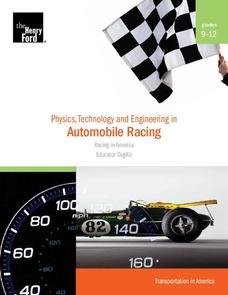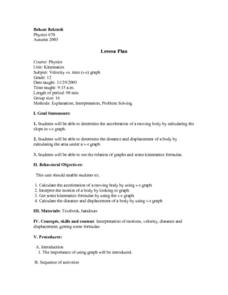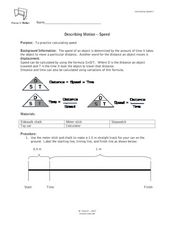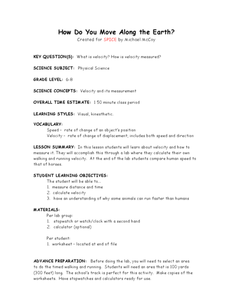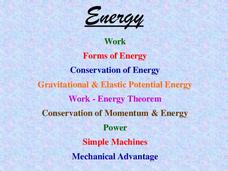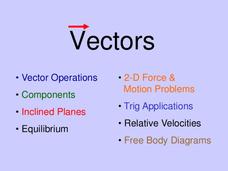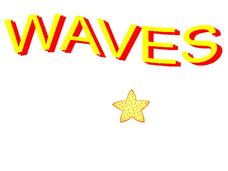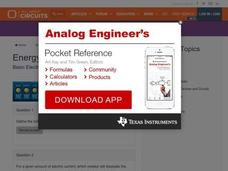Curated OER
Motion Problems
In this motion worksheet, learners complete motion word problems where they explain and define issues having to do with motion. Students complete 32 problems.
Curated OER
Dude, Who Hit My Car?
Young scholars discuss how investigators solve a hit and run accident. In this physical science lesson, students recreate an accident scene using CEENBot. They collect data from the experiment and formulate conclusion.
Curated OER
Investigating Newton's Second Law Of Motion
Students participate in a lesson that investigates Newton's Second Law of Motion. They conduct an experiment of observing balls that are rolled down a ramp. The lesson includes background information for the teacher for preparation and...
Henry Ford Museum
Physics, Technology and Engineering in Automobile Racing
Start your engines! This five-lesson unit introduces physics and Newton's laws through automobile racing. Each lesson includes background information, a student worksheet, and an answer key. There are also culminating project...
Curated OER
Vectors
Students differentiate distance and displacement. In this physics lesson, students use formulas to calculate for displacement. They draw vectors using the grid.
Curated OER
Velocity vs. Time
Twelfth graders read and interpret v-t graphs. After studying velocity and time, 12th graders read graphs to calculate the acceleration of a moving body and determine the distance and displacement of a body. Students explore the...
Curated OER
Describing Motion-Speed
Students study speed and learn how to calculate it. In this investigative lesson students participate in an activity that shows them how to calculate speed then they fill out a worksheet.
Curated OER
How Do You Move Along the Earth?
Students determine their own walking and running velocity. In this physics lesson, students calculate velocity using distance and time information. They compare human and animal speeds.
Urbana School District
Energy, Work, Simple Machines
The tension of the 236 strings in a grand piano exert a combined force of 20 tons on the cast iron frame. The presentation includes topics such as work, forms of energy, conservation of energy, gravitational and elastic potential energy,...
Curated OER
Velocity and Acceleration
Compliment your physics lesson with this PowerPoint which demonstrates many important points regarding acceleration and velocity. A starter experiment activity to stimulate student thinking is given, and may prove very interesting to a...
Urbana School District
Vectors
I don't always make vector jokes, but when I do, IJK. Vector addition using multiple methods, scalar multiplication, vector subtraction, vector components, relative velocities, free body diagrams, and so much more Are covered in this...
It's About Time
Making Waves
Young scientists use Slinkys to better understand waves. After creating and measuring many aspects of waves, they complete a handout and homework questions. The resource also introduces the final project for the chapter, though it does...
Bowels Physics
Torque: Rotational Statics and Rotational Dynamics
Scholars examine the application of torque in relation to motion by viewing a comprehensive presentation that explains the basic concepts related to torque and rotational motion. The lesson ends with examples showing how to calculate...
Curated OER
Waves
An incredibly colorful PowerPoint presents all the facts and definitions about waves that you could need for beginning physical scientists. There are several useful links to online animations of wave action. This may have been produced...
Flipping Physics
AP Physics 1: Kinematics Review
Test takers stressing out over the upcoming exam? Help them prepare for the AP Physics i exam with this fast-paced video that includes a complete guide to everything related to kinematics. Also included are some common errors and...
Curated OER
I Feel The Need For Speed
Students are introduced to the concepts of speed, velocity, acceleration and inertia. In groups, they use the internet to research rollercoasters found in the United States and calculate their acceleration rates. They use the...
Teach Engineering
Matching the Motion
It is not always easy to walk the straight and narrow. In the sixth portion of a nine-part unit, groups actively recreate a graph depicting motion. Individuals walk toward or away from a motion detector while trying to match a given...
Curated OER
Mineral Replacement in Fossil Formation
Fourth graders explore fossils and how they are formed. They create their own "fossils" out of plaster of Paris. They record their findings in their science journals.
Alabama Learning Exchange
Energy and Work Amusement Park Style
High schoolers distinguish between kinetic and potential energy. They recognize that energy can change from one form to other forms. They identify and describe several forms of energy.
K5 Learning
Why Does the Ocean have Waves?
Six short answer questions challenge scholars to show what they know after reading an informational text that examines waves—what they are, what causes them, and how different Earth factors affect their size and strength.
Curated OER
What is Motion?
In this motion worksheet, students will write in motion vocabulary words including velocity and speed to complete 7 statements. Then students will calculate average speed and velocity in three short answer questions.
Curated OER
Energy, Work and Power
In this energy, work and power worksheet, students solve 12 problems about circuits, electric motors, Ohm's Law and electric currents.
Curated OER
Exterior Ballistics
Students explore velocity and trajectory. Using exterior ballistics rules, students predetermine the path of an artillery shell. Given equations and the firing angle, students determine the velocity and horizontal travel. Students...
Curated OER
An Overview of Solar Radiation
Learners examine the Stefan-Boltzmann Law. Students compute basic radiative "constants" of the sun-Earth-atomosphere system. They examine the wavelength of maximum radiation emission.





